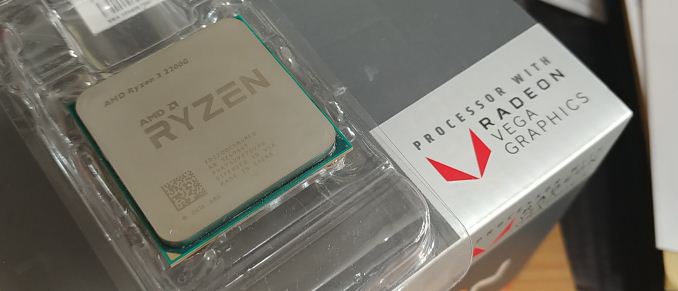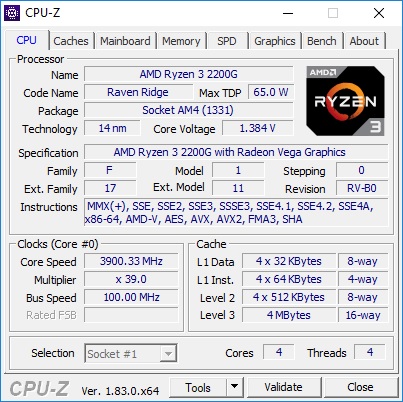Overclocking The AMD Ryzen APUs: Guide and Results
by Ian Cutress & Gavin Bonshor on April 16, 2018 2:30 PM ESTOverclocking The Ryzen 2000 Series APUs: The Conclusion
If we go back to our Ryzen 2000 Series APU review, it is clear that the Ryzen 3 2200G ($99) and Ryzen 5 2400G ($169) are true winners when it comes to building a gaming system on a budget, without making too much of a sacrifice, especially when focusing on popular gaming titles that do not require ultimate horsepower. Puting the Zen architecture with a good amount of Vega cores is mouthwatering for budget aficionados, as Intel offers nothing for this performance at this price. From an overclocking perspective, the Ryzen 2000 series does have more to offer, providing the system is well-rounded enough and capable of doing so; the APUs may be fully unlocked, but the system will need a B350/X370 chipset board to progress above the defaulted stock specifications.
In our testing, a consistent jump in performance was apparent when the CPU frequency, integrated graphics frequency, and memory, were all overclocked. We have already seen and delved into how memory scales on Ryzen CPUs, but with the capability of increasing and overclocking the Vega cores on the iGPU proves very fruitful in gaming. The only caveat with overclocking comes through extra power consumption and heat, but even with a modest overclock of 3.9 GHz on the 2200G, pushing memory up to DDR4-3333, and the integrated graphics to 1360 MHz, temperatures are well within the recommended guidelines when using a big cooler. This might be a drawback however, as the cooler bundled with the APUs was not up to the task of such a heavy push.
There are reports of the Ryzen 2000 series APUs going further than our sample was able to achieve. In each case our limit was on the temperatures, so we have a future article planned on delidding the processors and testing the difference to see if it is worth popping the heatspreader off to get a few more degrees off. As it stands, overclocking the Ryzen APUs has many benefits, and although they'll never reach the performance of processor at double the cost, for the market they are intended, an extra 7-30% (depending on the benchmark) is quite handy to have.
Overclocking is Dead: Long Live Overclocking
If we go back to the previous decade, processors such as the Q6600 were a prime example of when tweaking more than just the multiplier was required to get a decent overclock: the base clock was paramount in making extra performance. At the time, for that chip at least, the core multiplier was down at x9, and a base clock of 266 MHz gave the chip a frequency of 2.4 GHz. The only way to push the CPU frequency beyond that was by increasing the base clock.
The times where base clock overclocking was an important tuning factor to increasing performance has now changed. There have been times since where going +/- 10 MHz have been possible since, although that depended on the rest of the system (PCIe, chipset, DRAM) remaining stable. The only real need for base clock overclocking is in a competitive nature, where people compete against each other to see who has the bigger overclock. Being able to tune that important extra frequency on the CPU and memory can be the difference between a world record score or 30th place.
Even with AMD’s Zen core architecture, there has been the question popping up around on reddit and various communities about whether or not it’s worth overclocking purely with the multiplier or adding in some base clock tuning. The fact that the majority of the motherboards currently available on the AM4 socket do not have external clock generators means that extreme base clock tuning isn’t possible, and doesn’t give much weight to the users that want it. But the upside is that it is a lot easier for mainstream users to overclock especially processors like the Ryzen CPUs and Ryzen APUs.
Is Overclocking the Ryzen 2000 Series APUs Worth it?
The Ryzen 2000 series really can benefit from being pushed beyond the rated specifications by overclocking. Even within the safe parameters as specified by AMD in terms of voltages, the gains when the CPU core clock, graphics frequency, and memory are all pushed equate to a nice jump in performance. This can be the difference between playing at a decent frame rate and the game chopping around. Sure, the Ryzen series as a whole can benefit from an overclock, but for integrated gaming, overclocking the integrated graphics can a difference if the user requires the extra performance but doesn’t want to be burdened with the extra cost of upgrading.












63 Comments
View All Comments
Eidorian - Monday, April 16, 2018 - link
Alarms were going off in my head when it says in the article that the E2160 was from 2005. I have July 26, 2006 seared into my memory as Core 2 Duo Day. I see the E2160 IHS does say '05.https://ark.intel.com/products/29739/Intel-Pentium...
Ian Cutress - Monday, April 16, 2018 - link
IHS says 05, ARK says Q3 '06, CPU-World says May 2017.http://www.cpu-world.com/Releases/Desktop_CPU_rele...
jjj - Monday, April 16, 2018 - link
Pretty sure retail was early June 2007 (certain about year) for the Allendale Pentiums.jjj - Monday, April 16, 2018 - link
Some folks found it in retail in late May 2007http://www.overclockers.com/forums/showthread.php/...
Eidorian - Monday, April 16, 2018 - link
That looks good.https://web.archive.org/web/20070927002239/http://...
nathanddrews - Monday, April 16, 2018 - link
That 2200G is quite the little spitfire, relatively speaking. Not sure I would spend extra money for a better cooler on a budget gaming build, though. I would put that money toward an SSD or maybe a FreeSync display and then overclock as best I could.coolhardware - Monday, April 16, 2018 - link
I'm going with a 2200G for my son's first PC build. I remember my Pentium II 233 build with the help of Anandtech WAY back in the day, complete with SCSI HDD. It was a sweet system that lasted a long time.Now, back the AMD build, any mobo recommendations? I would like to keep it mini-itx if possible and I am leaning toward the GIGABYTE GA-AB350N:
https://amzn.to/2HFQAoS (~$109) but am open to suggestions.
Reliability is top concern and two digital video outs (HDMI, or DisplayPort, not analog DSUB). Starting with the integrated GPU but maybe down the road going discrete.
Thanks in advance for advice! :-)
coolhardware - Monday, April 16, 2018 - link
PS I remember Anand posting SO MANY motherboard reviews back when he was just a kid (and so was I). Back then I settled on a Tyan motherboard after his recommendation. :-)RaduR - Tuesday, April 17, 2018 - link
Back old ViA MVP3 platform . Yes we were kids and Anand was actually working here !gavbon - Tuesday, April 17, 2018 - link
There will be many more to come, don't worry about that!